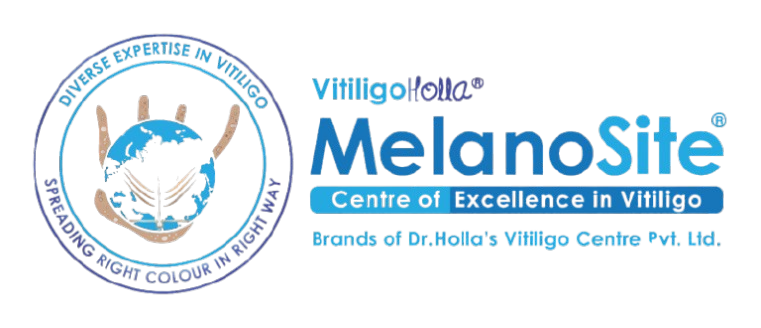Seven Important Fights:
Possible disease mechanism
Treatment
The most important factor in combating vitiligo is treatment. However, this is not everlasting. The treatments or interventions are gradually reduced or discontinued and replaced by maintenance strategy. These will also be withdrawn over time. Treatment dependency persists if the other 6 ways of vitiligo fights are not performed correctly and regularly. However, there is no miraculous remedy that will cure the vitiligo. Properly following the treatment prescribed by an expert will help to manage vitiligo.
Life Style Modifications
To make the treatment work better and to achieve vitiligo free status , one should follow healthy life style with sound sleep for 6 to 8 hours and daily physical activity like walking for 60 to 90 min( ideally 6km walking throughout the day/ 10000 steps helps a lot). Alcohol, smoking and substance abuse make vitiligo worse and lower the treatment effect, so one should quit them completely. Enough sleep reduces stress and free radicals, which help fight vitiligo and prevent its recurrence. Physical exercise improves metabolism and mood.
Diet Modifications
Diet modifications may be necessary to achieve optimal health outcomes and maintain disease remission However, diet alone will not recover or cause the vitiligo patches. The important thing is to follow moderation, balance and nutrition. We do not offer any diet chart, plan or list with details of foods to avoid or eat. One should focus on having a healthy breakfast on time, a moderate lunch on time and a light and early dinner. We recommend to reduce the intake of salt, sweet, oily food and junk foods (reduction does not mean avoidance, one can consume these in limit). One needs to consume good quantity of fibres (green leafy vegetable and vegetables), add probiotics in the diet. Its better to reduce the consumption of carbohydrates like rice, roti, bread, chapati, fruits and fruit juices (here to we suggest moderation and no need to avoid). We don’t suggest avoidance of non veg, dairy products, wheat and sour foods.
Skin Care
Taking care of the skin with moisturizers and sun protection is essential. Depending on the season, during winter months, focusing on moisturizing the skin is particularly important and in summer, the use of sunscreen or sun blocking agents should be a priority. In winter mostly the dryness causes itching which causes white patches and similarly in summer, the sun burn will increase the chances of new vitiligo patches. One should also steer clear of plastic and rubber shoes (chemical in these can cause chemical leukoderma in vitiligo prone person), socks with dark colours and hair dye with PPD chemical (the dye/colour can aggravate the vitiligo). Tight clothing and footwear that increases friction and in turn increase the white patches. Wearing loose clothing and footwear is advisable.
Stress Management
Stress has a major impact on the onset and worsening of vitiligo. This creates a vicious cycle. Stress raises free radicals/toxins, which aggravate vitiligo and vitiligo heightens stress. Stress also lowers the effectiveness of treatment. Therefore, managing stress is vital in combating vitiligo. Stress can not be removed or there is a medication which reduces stress. One needs to follow stress management. Meditation and walking does improve stress.
Attitude Management
Living with vitiligo can be challenging, but a positive attitude can transform the experience. Start by embracing self-acceptance—your worth goes far beyond physical appearance. Educate yourself about vitiligo to confidently handle questions and misconceptions, turning them into opportunities for awareness. Focus on building self-esteem through small, meaningful steps: practice positive affirmations, pursue your passions, and surround yourself with supportive people. Challenges may arise, but maintaining a positive mindset can help you grow stronger and more resilient.
Involvement
Patients’ participation in the vitiligo battle is a crucial element for achieving the desired outcome. Doctor’s or clinic staff’s role is like a coach. Family and friends have supportive role. Patients’ involvement and efforts are what makes the difference. Patients’ main goal should be to recover for themselves and not just for the sake of getting married, getting the job or for the sake of family or society.
